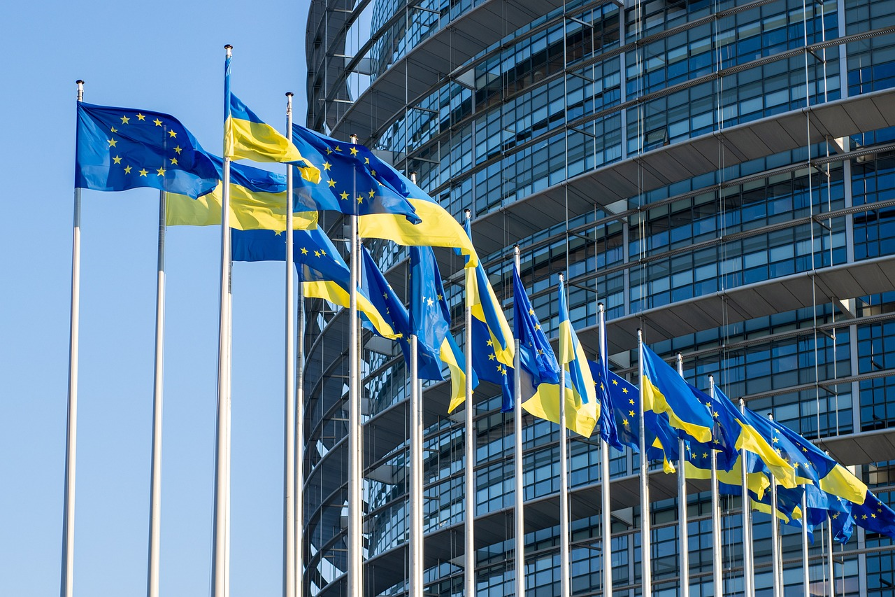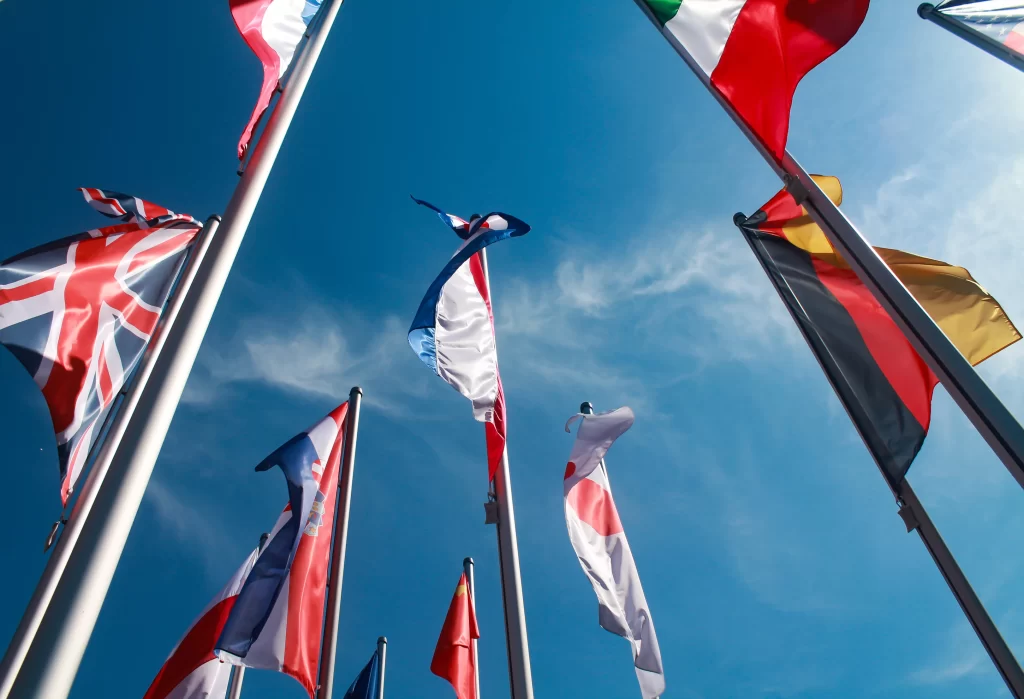Authors: Federico Alistair D'Alessio and Alessandro Spada - UK & European Affairs Team.
EU’s response
The European Union has firmly condemned Russia’s invasion of Ukraine, calling for an immediate ceasefire, military withdrawal and the respect of Ukrainian independence and territorial integrity.
European institutions have repeatedly denounced Russia’s war crimes in Ukraine, especially the indiscriminate attacks towards civilian infrastructures, hence accusing Russia of violating international law. Member states have thus strengthened both individual and economic sanctions against Russia while providing Ukraine with military equipment, humanitarian aid and financial support. For fear of an expansion of the conflict, several European governments have also significantly increased their own military spending.
While the Kremlin’s actions were unanimously condemned, the EU approach was not warmly welcomed by everyone in the European community, including the unconditional military support for Ukraine.
Division within the EU
Three apparent factions have emerged. Northern and post-communist member states fiercely supported Ukraine in the war, fearing a Russian victory that would threaten their national security. Western European countries such as France, Germany and Spain insist on vigorous diplomatic efforts and have adopted a more cautious approach. Lastly, the third bloc is composed of those members who have refused to send weapons and have expressed a rather ambiguous stance on the war, such as Hungary and, to a lesser extent, Bulgaria.
Among the first group, the Baltic states and Poland have been the most loyal partners of Ukraine for obvious historical and geopolitical reasons.
Baltic states
The firm reaction of Lithuania, Estonia and Latvia did not come as a surprise, given their past experiences with invasions and annexations by the Kremlin. Their warnings on the threat posed by Russia in Central and Eastern Europe were mostly ignored or downplayed by their partners and accused of Russophobia by the Kremlin.
The Baltic States substantially increased their military spending and gradually abandoned their dependence on Russian energy after the 2014 Russian annexation of Crimea. Since the 2022 invasion, they have actively supported Kiev with military and humanitarian aid as they feel the fate of their nations is tightly linked to Ukraine.
They believe the only way to achieve peace is to help Ukraine win the war and force Russia back to its borders, as stated by Estonian PM Kaja Kallas. In addition, the Baltics have regularly called for stronger EU and NATO action, fearing that their allies would lose the momentum to stop Russia once and for all. As of December 2023, all three Baltic states rank in the top five GDP contributors of government support to Ukraine.
Poland
Likewise, Poland declared not only full military, financial and humanitarian support for Ukraine, but also the intention of defeating Russia on all fronts as a way to achieve peace. Growing anti-Russian sentiment is evident among Poles, with a peak of 94% viewing Putin as a serious threat post-Ukraine invasion. This sharp rise has consequently brought to more positive attitudes (around 90%) towards the US, NATO and the EU.
In addition to welcoming over 3 million Ukrainian refugees, the Polish government has also mediated between Ukraine and the US, advocating for adequate protection and high-end military equipment. Moreover, their push for Ukraine's EU and NATO integration has significantly reduced EU criticism regarding the rule of law in Poland.
Nevertheless, recent grain embargo disputes have strained relations with Ukraine, leading to a Polish weapons supply halt and a potentially damaging impact on both nations.
United Kingdom
Despite the UK leaving the EU, it is crucial to also analyse the reaction of the British government given its historical role as a security guarantor in Europe. On November 16, 2023, Foreign Secretary David Cameron reaffirmed support for Ukraine against Putin's aggression. The UK, a leading supporter, provides significant military, humanitarian, and financial aid, ranking as the third-largest donor behind the US and Germany. It was the first to supply cruise missilesand depleted uranium munitions to Kyiv and additionally implemented a series of sanctions against Moscow. The British Government advocates for a shorter Ukraine's path to NATO membership by removing the need for a Membership Action Plan, as a result of the summit held in Vilnius last July. Furthermore, secret talks between UK officials and key Russian representatives have reportedly taken place, discussing security matters such as grain shortages and nuclear safety.

France
While President Macron has supported Ukraine since the outbreak of the conflict, he has kept a more diplomatic stance in comparison to other European leaders. A few weeks before Russia's invasion, he attempted to dissuade Putin and emphasised avoiding humiliation for diplomatic solutions. During an April visit to China, Macron urged Xi Jinping for a mediation in favour of a return to the “negotiating table”. Despite fewer arms transfers (data from Sept. 26, 2022, to Nov. 30, 2023) to Ukraine compared to some NATO allies, France ultimately backs Ukraine's NATO accession to increase pressure on Russia and pave the way for post-war negotiations.
Germany
The full-scale invasion of Ukraine forced Germany to reassess its role in the world, shifting from "chequebook diplomacy" to increased military involvement. As the second-largest arms supplier (commitments Jan. 24, 2022, to Oct. 31, 2023) of Ukraine after the US, Germany has invested €100 billion in a military fund for modern weapons and committed to meeting NATO's 2% GDP defence spending target. Chancellor Olaf Scholz also encouraged China to use its influence to promote diplomatic solutions. Germany opposes immediate NATO membership for Ukraine, fearing direct conflict with Russia and citing unresolved border conflicts as a hindrance. Additionally, Germany is pushing for a reform plan where the conditions listed must be met in order to initiate a discussion on the membership.
Hungary
As previously mentioned, Hungary has condemned Russian aggression while adopting a questionable approach to dealing with the Kremlin.
Firstly, PM Viktor Orbán decided to abstain from sending military support to Kiev and even agreed on a new gas deal with Moscow a few months after the invasion started. In addition, state-controlled media outlets have continued to spread pro-Russian propaganda, including criticism against the sanctions imposed on Russia. Orban has also recently requested the EU to reassess their strategy in the war while threatening to halt all support to Ukraine.
This peculiar reaction to the Russian invasion reflects the local population as well. According to a recent poll, only 33% of Hungarians consider Russia a major military threat. Another vital figure to mention is the Hungarian perception of the US and Russia: only 17% believe the United States are an important partner, comparable to the 11% that think Russia is. This data openly displays how divergent Budapest’s attitude is from the rest of the EU.
Conclusion
The EU’s unified reaction was initially seen as an opportunity to create a new and common geopolitical strategy. Despite claims of unity, the EU is increasingly divided between those prioritising peace diplomatically and those insisting on justice achieved solely through a Russian military defeat.
This crisis has also exposed the union’s reliance on the US and NATO in terms of defence and intelligence. This is mainly due to the fact that the EU was conceived as a political and economic institution, rather than a military power. However, given that European cohesion has also emerged thanks to continuous information provided by Washington, this poses the risk of condemning Europe to political and military irrelevance. Historical security leaders, such as the UK and France, face several challenges - with Germany expected to play a pivotal role.
Moreover, debates on EU military independence versus complementarity with NATO face growing divisions among member states, evident in recent controversies and wavering support for Ukraine - such as the case of neighbouring Slovakia. The question remains whether the EU can establish an independent defence system amid increasing uncertainties.

